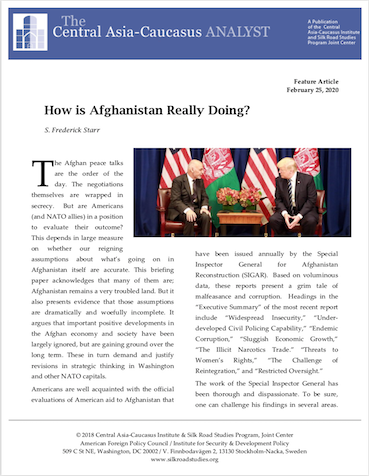How is Afghanistan Really Doing?
By: S. Frederick Starr
The Afghan peace talks are the order of the day. The negotiations themselves are wrapped in secrecy. But are Americans (and NATO allies) in a position to evaluate their outcome? This depends in large measure on whether our reigning assumptions about what’s going on in Afghanistan itself are accurate. This briefing paper acknowledges that many of them are; Afghanistan remains a very troubled land. But it also presents evidence that those assumptions are dramatically and woefully incomplete. It argues that important positive developments in the Afghan economy and society have been largely ignored, but are gaining ground over the long term. These in turn demand and justify revisions in strategic thinking in Washington and other NATO capitals.
Americans are well acquainted with the official evaluations of American aid to Afghanistan that have been issued annually by the Special Inspector General for Afghanistan Reconstruction (SIGAR). Based on voluminous data, these reports present a grim tale of malfeasance and corruption. Headings in the “Executive Summary” of the most recent report include “Widespread Insecurity,” “Under- developed Civil Policing Capability,” “Endemic Corruption,” “Sluggish Economic Growth,” “The Illicit Narcotics Trade.” “Threats to Women’s Rights,” “The Challenge of Reintegration,” and “Restricted Oversight.”
The work of the Special Inspector General has been thorough and dispassionate. To be sure, one can challenge his findings in several areas.




